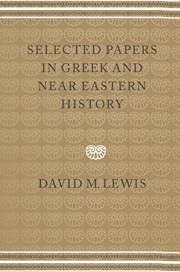Book contents
- Frontmatter
- Contents
- List of plates
- Preface
- Systems of reference
- GENERAL
- ATHENIAN
- 9 Public property in the city
- 10 Cleisthenes and Attica
- 11 Review of J. S. Traill, The Political Organization of Attica
- 12 Review of P. Siewert, Die Trittyen Attikas und die Heeresreform des Kleisthenes
- 13 The Kerameikos ostraka
- 14 Megakles and Eretria
- 15 The Athenian Coinage Decree
- 16 Athena's robe
- 17 The treaties with Leontini and Rhegion
- 18 Entrenchment-clauses in Attic decrees
- 19 Apollo Delios
- 20 After the profanation of the Mysteries
- 21 Aristophanes and politics
- 22 Who was Lysistrata?
- 23 A note on IG i2114 [= i3105]
- 24 The epigraphical evidence for the end of the Thirty
- 25 The financial offices of Eubulus and Lycurgus
- 26 The dating of Demosthenes' speeches
- 27 Law on the Lesser Panathenaia
- 28 The Athenian Rationes Centesimarum
- 29 The chronology of the Athenian New Style Coinage
- 30 Review of M. Thompson, The New Style Silver Coinage of Athens
- NEAR EASTERN
- Bibliography
- Publications of David M. Lewis
- Indexes
18 - Entrenchment-clauses in Attic decrees
Published online by Cambridge University Press: 15 January 2010
- Frontmatter
- Contents
- List of plates
- Preface
- Systems of reference
- GENERAL
- ATHENIAN
- 9 Public property in the city
- 10 Cleisthenes and Attica
- 11 Review of J. S. Traill, The Political Organization of Attica
- 12 Review of P. Siewert, Die Trittyen Attikas und die Heeresreform des Kleisthenes
- 13 The Kerameikos ostraka
- 14 Megakles and Eretria
- 15 The Athenian Coinage Decree
- 16 Athena's robe
- 17 The treaties with Leontini and Rhegion
- 18 Entrenchment-clauses in Attic decrees
- 19 Apollo Delios
- 20 After the profanation of the Mysteries
- 21 Aristophanes and politics
- 22 Who was Lysistrata?
- 23 A note on IG i2114 [= i3105]
- 24 The epigraphical evidence for the end of the Thirty
- 25 The financial offices of Eubulus and Lycurgus
- 26 The dating of Demosthenes' speeches
- 27 Law on the Lesser Panathenaia
- 28 The Athenian Rationes Centesimarum
- 29 The chronology of the Athenian New Style Coinage
- 30 Review of M. Thompson, The New Style Silver Coinage of Athens
- NEAR EASTERN
- Bibliography
- Publications of David M. Lewis
- Indexes
Summary
There is a personal anniversary for me besides that which we all celebrate, since it is just twenty-five years since Meritt answered a piece of undergraduate scepticism of mine, sent on to him by Tod, with infinite thoroughness and courtesy. In the years between, his care and patience with my troubles have never failed, my errors have been firmly dealt with, my occasional intransigences have been readily forgiven. I cannot begin to estimate my debt to him.
I define an entrenchment-clause as a clause inserted in a decree in an attempt to give it greater permanence and to limit any future attempt by those who might think it δɛιν ɛiναι ɛi μè Τις Eάσɛι Τòν πράΤΤɛιν O aνβoύληΤαι to reverse the decree by making it impossible or at least very difficult and dangerous to do so. There are a fair number of examples and the phenomenon seems to me of some importance for the development of Athenian ideas on legislation. In a period in which, at least for current legislation, the distinction between νóμoς and ψήϕισμα was far from clear, such clauses seem to constitute an interesting experimental approach to the problem of reconciling the demands of certainty and popular sovereignty. They are, however, as far as I can see, remarkably neglected. Since a clear paragraph by Busolt in 1920 I find nothing but a brief collection of largely non-Attic material by Tod, and their non-appearance in Hignett's History of the Athenian Constitution and in Kahrstedt's discussion of the development of Athenian law-making suggests that it may be justifiable to attempt to collect and understand the material.
- Type
- Chapter
- Information
- Selected Papers in Greek and Near Eastern History , pp. 136 - 149Publisher: Cambridge University PressPrint publication year: 1997
- 3
- Cited by



